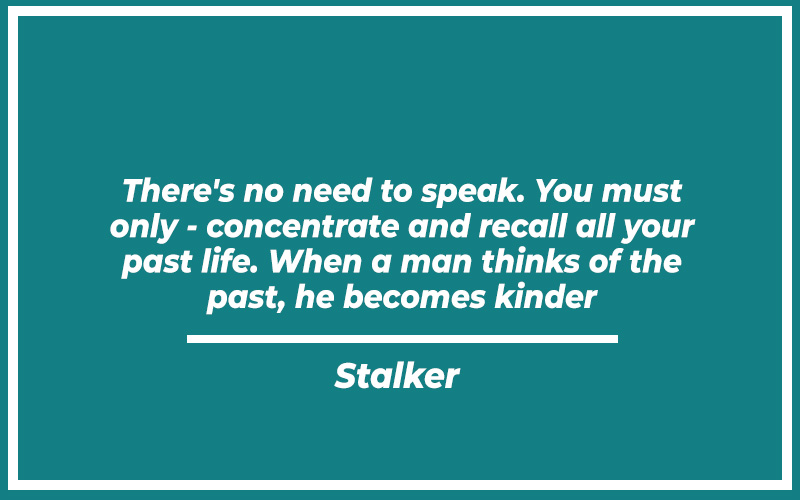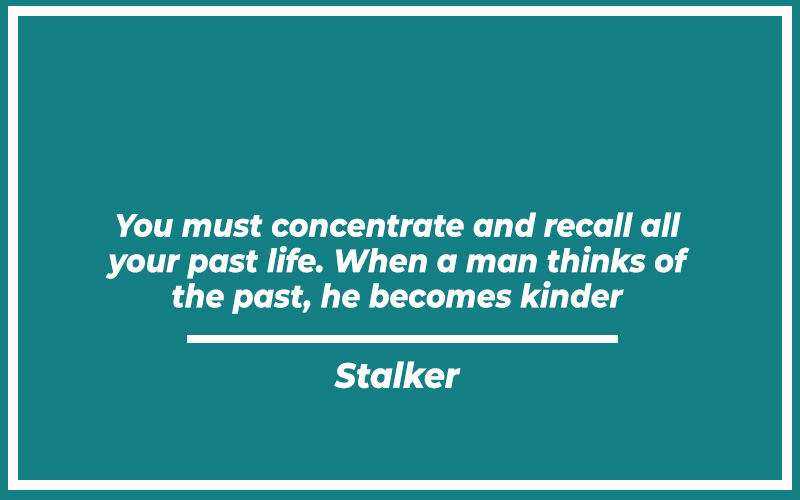The literal meaning of stalker has to do with creepy and dangerous behavior. But the 1979 film “Stalker” takes a different approach.
It explores the world of stalkers, who guide people illegally through a mysterious and dangerous “Zone” rumored to grant wishes.
These are some quotes that talk about the motivations of the characters, the allure of the Zone, and the questions it raises about human desire and the price of fulfillment.
Best Stalker Quotes

“There’s no need to speak. You must only – concentrate and recall all your past life. When a man thinks of the past, he becomes kinder.” – Stalker
This quote reflects on the power of introspection and memory. The Stalker suggests that recalling one’s past can evoke a sense of kindness, as memories often bring a reflective and compassionate view of oneself and others.
By delving into one’s experiences and understanding past actions and emotions, a person can develop empathy and a softer outlook on life. The idea here is that introspection is not just about self-critique but also about nurturing an understanding heart.
Also Read: Edna Mode Quotes (with Explanations)
“You can’t be happy at the expense of other’s unhappiness.” – Stalker
The Stalker conveys a profound moral principle, emphasizing that true happiness cannot be built on the suffering of others. This statement is a critique of selfish or exploitative behaviors, highlighting the interconnectedness of human experiences.
It suggests that ethical living involves considering the well-being of others and that one’s joy should contribute to, rather than detract from, the collective happiness of society.
“A man writes because he is tormented, because he doubts. He needs to constantly prove to himself and the others that he’s worth something. And if I know for sure that I’m a genius? Why write then? What the hell for?” – Writer
The Writer’s quote delves into the existential motivation behind creative endeavors. Writing, as he explains, stems from inner turmoil and the need for validation. This internal struggle drives the creative process, compelling the writer to express doubts and seek acknowledgment.
However, if one were completely confident in their genius, the act of writing might seem redundant, stripping away the underlying purpose fueled by uncertainty and self-exploration.
“In the Zone, the longer way, the less risk.” – Stalker
This quote emphasizes the idea that shortcuts in life often come with greater dangers. The Stalker advises that taking a more measured, careful approach can mitigate risks.
This can be interpreted as a broader life lesson about patience and caution, suggesting that haste and seeking the quickest route can lead to unforeseen complications and hazards.
“The Zone is a very complicated system of traps, and they’re all deadly. I don’t know what’s going on here in the absence of people, but the moment someone shows up, everything comes into motion. Old traps disappear and new ones emerge. Safe spots become impassable. Now your path is easy, now it’s hopelessly involved.” – Stalker
This quote encapsulates the unpredictability and complexity of the Zone. The Stalker describes it as a dynamic environment that changes in response to human presence.
This serves as a metaphor for the uncertainties and constant shifts in life, where what seems safe and straightforward can suddenly become perilous and convoluted. The Zone’s behavior reflects human psychology and the intricate nature of existence.
“What comes true here is that which reflects the essence of your nature. It is within you. It governs you. Yet you are ignorant of it.” – Writer
Here, the Writer suggests that the Zone reveals one’s deepest desires, which are often unknown even to oneself. This concept speaks to the subconscious mind’s power and how hidden motivations and desires shape our reality.
The quote emphasizes self-discovery and the often-hidden aspects of one’s personality that govern actions and decisions, urging a deeper understanding of oneself.
“There’s nothing else left to people on Earth. This is the only place to come to when all hope is gone.” – Stalker
The Stalker speaks to the idea of the Zone as a last resort for those who have lost all hope. It represents a place of ultimate desperation but also of potential redemption. This quote reflects on human despair and the search for meaning or salvation when all other avenues have failed.
It underscores the Zone as a place where one’s truest desires and hopes can be confronted and possibly fulfilled.
“All your technology, all those blast furnaces, wheels, and suchlike hustle and bustle, so that people can work less and consume more, they’re all crutches, artificial limbs. Mankind exists in order to – to create works of art.” – Writer
The Writer criticizes the industrial advancements and material pursuits of humanity, deeming them superficial aids rather than essential elements of life. He suggests that the true purpose of human existence is to create art, which he views as a noble and unselfish endeavor.
This perspective challenges the conventional notion of progress, proposing that artistic expression is the ultimate goal and most authentic manifestation of human effort, beyond mere consumption and technological achievements.
“My conscience wants vegetarianism to win over the world. And my subconscious is yearning for a piece of juicy meat. But what do I want?” – Writer
This quote highlights the internal conflict between the Writer’s ethical beliefs and his primal desires. It exemplifies the struggle many face between their ideals and their instincts.
The Writer’s contemplation reflects the broader theme of self-awareness and the complexities of human nature, where conscious and subconscious motivations often clash. It underscores the difficulty in reconciling one’s moral convictions with innate desires, posing a philosophical question about the true nature of personal wants.
“Forget your rucksack. What’s in it? Diamonds? You’ll lose your way. The Room will give you all you desire. It will snow you under with rucksacks.” – Writer
The Writer’s statement is a metaphorical warning against clinging to material possessions and distractions. He suggests that the Room, symbolic of ultimate fulfillment, will overwhelm those who focus on superficial gains.
This quote underscores the film’s exploration of desire and the futility of materialism. It emphasizes the need to prioritize genuine, intrinsic aspirations over external wealth and possessions, highlighting the transformative journey towards understanding and attaining true fulfillment.
“Truth is born in arguments, damn it.” – Professor
The Professor asserts that through the clash of ideas and debate, a deeper understanding and truth can be uncovered. This quote reflects the film’s theme of intellectual and existential exploration, suggesting that conflict and discourse are essential for reaching clarity and insight.
It champions the value of questioning and challenging perspectives, proposing that through argumentation and critical thinking, more profound truths about life and existence can emerge.
“You have been lucky, it just warned you.” – Stalker
The Stalker tells the Writer that the Zone has merely warned him, implying that the dangers within it are real and imminent. This quote highlights the unpredictability and capricious nature of the Zone, which mirrors the uncertainties of life.
The concept of being “warned” underscores the importance of awareness and caution when navigating perilous situations. It serves as a reminder that luck can be fleeting and that one must remain vigilant and respectful of the forces at play.
“Prison? I’m imprisoned everywhere.” – Stalker
The Stalker’s remark reflects his sense of existential entrapment, suggesting that his confinement is not limited to physical imprisonment but extends to his entire existence. This quote encapsulates the pervasive theme of entrapment and the struggle for freedom within the film.
It highlights the psychological and emotional constraints that the characters face, emphasizing the idea that true freedom is not merely about physical liberation but also about overcoming internal and existential barriers.
“The Zone wants to be respected. Otherwise, it will punish.” – Stalker
This quote highlights the mysterious and almost sentient nature of the Zone. It emphasizes that the Zone demands respect and that those who fail to give it will face severe consequences.
This can be interpreted as a broader life lesson about respecting the unknown and approaching uncertain situations with caution and reverence. It also reflects the film’s underlying themes of reverence for the enigmatic and the dangers of hubris when confronting the unknown.
“In the Zone, the longer way, the less risk.” – Stalker
The Stalker’s wisdom here speaks to the value of patience and caution. It implies that taking a more measured, deliberate approach can help avoid danger and ensure a safer outcome.
This quote can be applied to various life scenarios, suggesting that shortcuts and hasty decisions often come with unforeseen risks. It underscores the importance of prudence and the benefits of a careful, considered path over a seemingly easier but perilous shortcut.
“It is so quiet out here, it is the quietest place in the world.” – Stalker
This quote captures the profound silence and eerie tranquility of the Zone. It suggests a stark contrast between the chaotic human world and the stillness of the Zone. The quietness can be interpreted as both peaceful and unsettling, reflecting the film’s theme of isolation and introspection.
The Zone’s silence invites characters and viewers alike to reflect deeply on their thoughts and feelings, highlighting the meditative and contemplative nature of this enigmatic place.
“The Zone is a very complicated system of traps, and they’re all deadly. I don’t know what’s going on here in the absence of people, but the moment someone shows up, everything comes into motion.” – Stalker
This quote illustrates the Zone’s dynamic and perilous nature. The Stalker describes how the Zone’s traps activate in the presence of people, suggesting a reactive and almost conscious environment. This serves as a metaphor for the unpredictability and complexity of life, where safe paths can suddenly become dangerous.
It also reflects the film’s exploration of the psychological and emotional traps that people encounter, emphasizing the need for vigilance and adaptability.

“You must concentrate and recall all your past life. When a man thinks of the past, he becomes kinder.” – Stalker
Reflecting on the past can evoke a sense of kindness and empathy, as suggested by the Stalker. This quote emphasizes the value of introspection and the transformative power of memories. By recalling past experiences, a person can develop a deeper understanding and compassion for themselves and others.
It highlights the film’s theme of self-reflection and the idea that understanding one’s history is essential for personal growth and empathy.
“What comes true here is that which reflects the essence of your nature. It is within you. It governs you. Yet you are ignorant of it.” – Writer
This quote delves into the concept of the Zone revealing a person’s deepest desires. The Writer suggests that these desires are often unknown to the individual but still shape their actions and decisions. This speaks to the power of the subconscious mind and the hidden motivations that govern behavior.
The film explores the idea that true self-awareness requires understanding these deep-seated desires and confronting the aspects of oneself that are typically hidden.
“There’s no going back. Nobody goes back the same way they came.” – Stalker
The Stalker emphasizes the irreversible nature of experiences in the Zone. This quote suggests that once someone enters the Zone, they are changed forever. It reflects the broader theme of transformation and the idea that profound experiences leave a lasting impact.
This can be seen as a metaphor for life’s significant events, which alter a person’s perspective and identity, making it impossible to return to a previous state of being.
“Here the shortest path isn’t the simplest. The more indirect, the less risk there is.” – Stalker
This quote underscores the paradox that often, taking a longer, more circuitous route can be safer and more reliable than a direct path. It speaks to the value of caution and patience, suggesting that avoiding shortcuts can help mitigate potential dangers and challenges.
This can be applied to many aspects of life where hasty decisions may lead to unforeseen complications, whereas a more deliberate and thoughtful approach can ensure better outcomes, even if it takes longer.
“I’ve never met a single happy person in my life.” – Stalker
This somber reflection on human existence points to a pervasive sense of disillusionment and despair. The Stalker’s statement suggests that happiness is elusive, possibly even unattainable, within the context of their world. It highlights the theme of existential crisis prevalent in the film, where characters grapple with their inner turmoil and the harsh realities of their environment.
This quote evokes a profound contemplation on the nature of happiness and the human condition, questioning whether true contentment is ever truly within reach.
“This is the most important moment of your life. Your sincerest desire will come true here. The desire that has made you suffer most.” – Stalker
The Stalker emphasizes the significance of the Zone as a place where one’s deepest desires can be realized. This quote reflects the central theme of the film, where characters confront their innermost wishes and fears.
It suggests that the fulfillment of these desires is a momentous event, laden with both potential joy and pain. The idea that one’s greatest suffering stems from their most sincere desire underscores the complex interplay between longing, fulfillment, and the human psyche.
“A man writes because he is tormented, because he doubts. He needs to constantly prove to himself and the others that he’s worth something.” – Writer
The Writer articulates the intrinsic struggle that drives the creative process. This quote highlights the notion that creativity often stems from internal conflict and a need for self-validation. The act of writing becomes a means of grappling with self-doubt and seeking affirmation.
It reflects the broader existential themes of the film, where characters are driven by deep-seated insecurities and a relentless quest for meaning and purpose in their lives.
“My God, what kind of people are they? The look of their eyes is blank. They’re thinking how not to sell themselves cheap. How to earn more, how to get paid for every breath they take.” – Writer
The Writer’s observation is a scathing critique of societal materialism and the commodification of human existence. This quote laments the loss of genuine human values in a world obsessed with profit and self-interest.
The blank eyes symbolize a lack of soul and purpose, portraying a society where people are consumed by greed and superficial concerns. This critique resonates with the film’s exploration of existential despair and the search for deeper meaning amidst a morally bankrupt world.
“He wants to destroy your hope. There is nothing left on Earth. This is the only place to come when all hope is lost! Why destroy hope!” – Stalker
The Stalker passionately defends the significance of the Zone as a sanctuary for the hopeless. This quote emphasizes the theme of hope and its essential role in human survival. The idea that the Zone is the last refuge for those who have lost all hope underscores its symbolic importance.
The Stalker’s plea to preserve hope reflects the film’s exploration of existential despair and the desperate search for meaning and redemption in a desolate world.
“You dream of one thing and get something quite different.” – Stalker
This quote captures the unpredictability and irony of human desires. The Stalker points to the inherent discrepancy between dreams and reality, suggesting that what we long for often does not materialize as expected.
This reflects the film’s broader themes of disillusionment and the elusive nature of fulfillment.
Also Read: Savage Ex Quotes (with Explanation)
Final Thoughts
There’s often a cost to getting what we want, and that the journey itself can be just as, if not more, important than the destination.
The quotes from “Stalker” offer a glimpse into a world where the line between reality and desire blurs.

